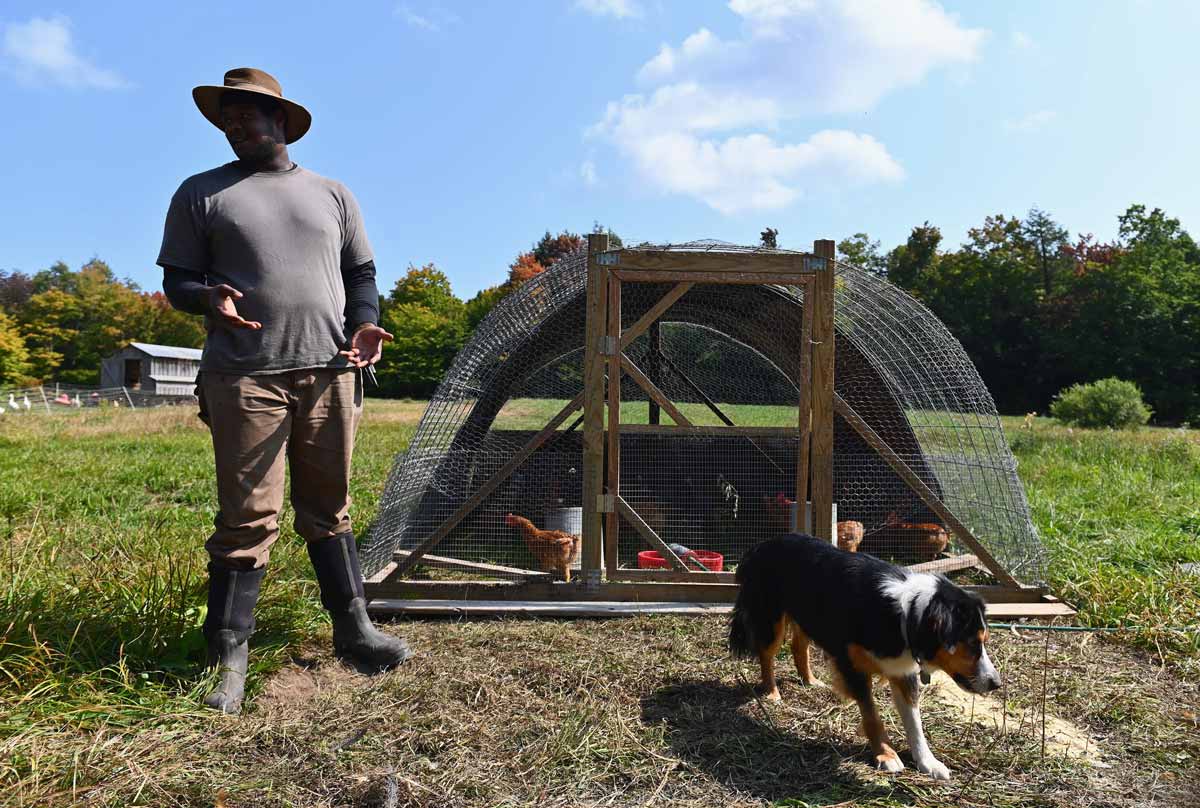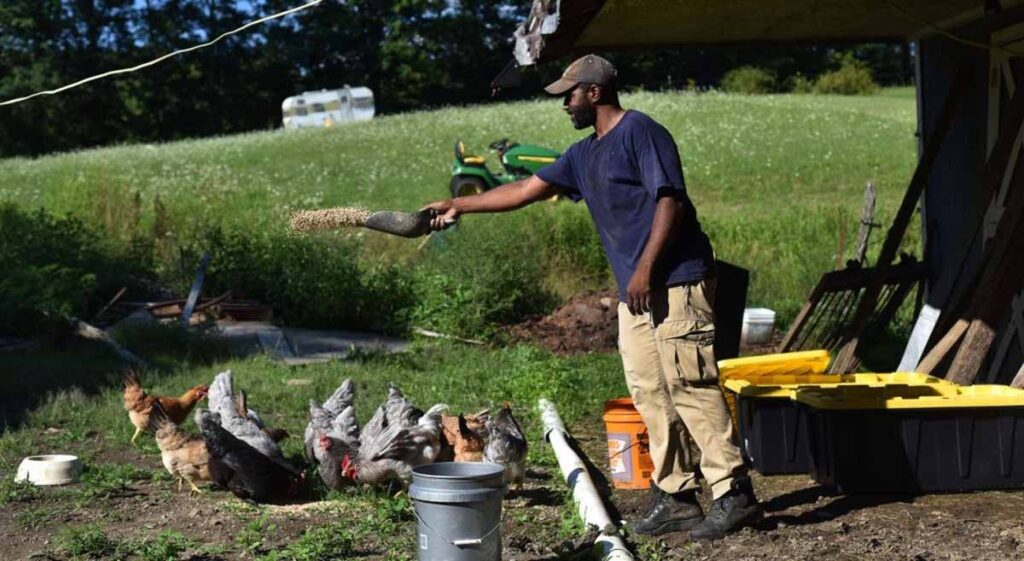Environment
State Allots Millions for Farmers, Climate, Migrants, Asylum Seekers

Gov. Hochul’s Climate Week Announcement Recalls
Story of a Farming Family’s Efforts in Environmental Sustainability,
Generational Wealth Stewardship and NYS Farm Diversity
Efforts to monetize Climate Change issues can only be discussed theoretically. An announcement by Governor Kathy Hochul of a new award to New York farmers could link Black farming to increasing Black Generational Wealth.
Yesterday, as we were headed to press, the Governor announced over $13.8 million has been awarded to 33 projects across the state through the State’s Agricultural Nonpoint Source Abatement and Control Program. The funding supports agricultural water quality conservation projects, which will benefit 80 farms, enhance water quality in priority watersheds, and protect the environment. This announcement comes during Climate Week 2023 and is part of Governor Hochul’s commitment to protecting the state’s natural resources and environment through New York State’s leading climate agenda.
“New York State has long been a leader in the fight against climate change, and today, I’m proud to say that we are continuing that legacy with this round of funding,” Governor Hochul said. “Preserving our environment starts with ensuring our communities across the state have the resources to implement sustainable methods and best management practices. These projects will protect clean water across New York State and help New York’s farmers continue their work to mitigate the impacts of climate — creating a brighter future for all.”
There are approximately 139 Black owned farms in New York State. We hope there’s a fair number of them selected to participate in the award announced by our Governor.
The announcement brought to mind the on-going work of a black-owned Windsor, New York family to keep Black farms supported, acknowledged and alive. Published by Binghamton University in 2020, the story has relevance today, and a Brooklyn footnote, as well. — Bernice Elizabeth Green
Triple J Farm seeks to create generational wealth for black families, inspire black farmers
By Sarah Merke
bupipedream.com
It’s been a decade since James Minton, owner of Triple J Farm, left his Harlem home for 20 acres of land in Windsor, New York. With the help of his wife Wilhelmina and their family, Minton has now created a multigenerational Black-owned company.
“Family is everything to us, it’s the reason why my grandfather moved to Windsor,” said Jarrad Nwameme, 32, chief executive officer of Triple J Farm and the grandson of James Minton, who currently resides in Brooklyn, NY. “He wanted a place for his family if something ever went wrong in the city, and he loves the fact that he can offer a place for [his] family to visit if they ever need peace of mind.”
With seven children of his own, 28 grandchildren, 40 great-grandchildren and one great-great-grandson, Minton and his family owns 400 chickens, four ducks, four turkeys, six dogs and their cow, Maribel. Nwameme handles the logistics of the company, including its social media pages and events, alongside his cousins.

The decision to move upstate not only allowed Minton to fulfill his childhood dreams becoming a farmer, but also the chance to demand change in the agriculture industry. According to the USDA Census of Agriculture, Black farmers have not only lost 80 percent of their land from 1910 to 2007, but the percentage of Black farmers has dropped drastically over the years. In 2012, it was reported that Black farmers made up less than two percent of all farmers in comparison to the 14 percent seen in 1910. In response, Triple J Farms has decided to shift the narrative by promoting Black representation through the hashtags “#BuyLand”, “#MakeFarmersBlackAgain” and “#GenerationalWealth” that can be found inside their egg cartons.
“Imagine waking up every morning to the message, ‘Buy land,’” Nwameme said. “That’s going to be embedded in your head subconsciously and you’re just going to go out and do it. The message goes beyond Triple J Farm. It’s a message I think everyone needs to hear. We want to empower our communities and support Black people working with family to create generational wealth.”
To purchase eggs, individuals can visit Triple J Farm’s website at https://triplejfarmnyc.com or visit them on Tuesdays at the Downtown Courtyard Market in Binghamton.
“We’re a different kind of farm, we’re trying to connect the younger audience with the idea of farming,” Nwameme said. “Everyone loves brunch and because we can’t sit inside anymore, we created ‘Brunch & Go’ which provides people with the brunch ambiance. It’s fun, there’s good music and we offer people our specialty omelet — shrimp/lobster, egg white, veggie and meat lover — alongside a dozen of our eggs with a sangria or mimosa.”
When constructing future events for Triple J Farm, Nwameme and his family are keeping legacy and Black excellence in mind.
“My grandfather laid the foundation in order for our legacy to continue,” Nwameme said. “He’s just a giving man who’s done a lot for so many people, and I’m so happy and proud that he’s getting so much back in return. My grandfather raised his kids in the streets of Harlem in the ’50s, ’60s and ’70s which was tough, and the fact that we’re here now, telling our story is not something we would’ve thought 20 years ago. That’s Black excellence to me; the ability to always be above average, work with integrity and do the unexpected. If we can inspire and empower our communities to create generational wealth, then we’ve done our job at Triple J Farm.” For more current information on Triple J Farms, visit: triplejfarmnyc.com
The Governor’s announcement supports “on-farm environmental planning and the implementation of best management practice (BMP) systems to keep nutrients and other potential pollutants from entering waterways, promote soil health and aid farms to be more resilient to climate change driven extreme precipitation. BMPs include a variety of measures, including installing vegetative buffers along streams, planting cover crops, enhancing nutrient management through manure storage, and other conservation measures.













